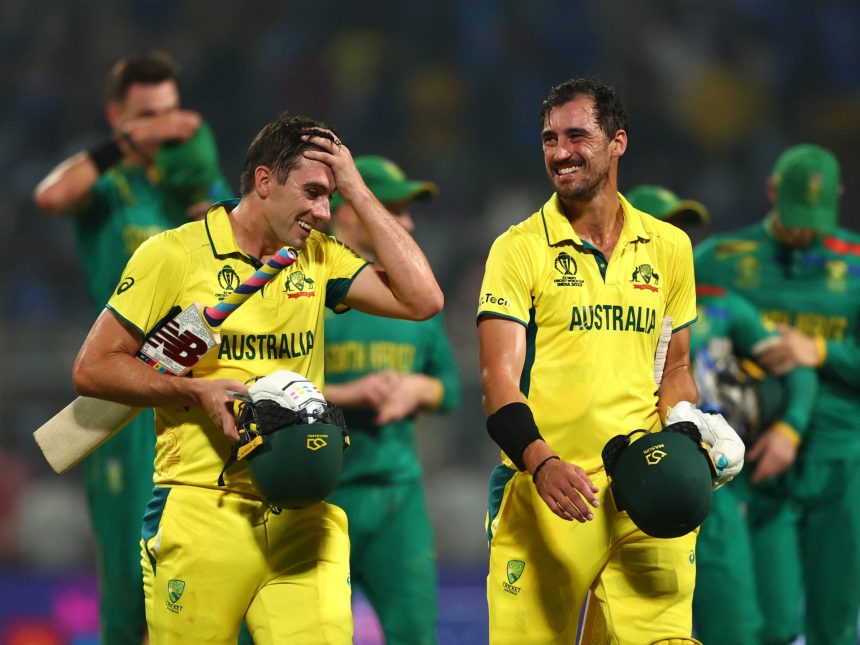[ad_1]
Kolkata, India – The skies above Eden Gardens were leaden and grey, the air thick with a stifling mix of humidity, smog and the question of which team would meet India in Sunday’s Cricket World Cup Final.
Kolkata had pulsed with vibrant colour and noise all week in the midst of concurrent festivals of Diwali, symbolising light’s triumph over darkness, and Kali Puja, celebrating the victory of good against evil.
Thursday’s semifinal wasn’t a contest of such absolutes, instead a battle between the almost-guys and the we’ve-done-it-all-before guys. South Africa have played in four World Cup knockouts without clearing the final hurdle; Australia have lifted the trophy five times, more than any other nation.
If intergenerational trauma exists, then logic suggests the opposite must also; this Australian team carries the belief that conquering the vagaries of tournament play is in their blood. It gives them a certain swagger and underlies their aggressive self-belief.
Consider the pronouncement of their captain, Pat Cummins, on the eve of the match: “We’ve got a lot of guys that have been in this situation before that have won a One Day World Cup, T20 World Cup, various other tournaments in big moments. So, I think that really helps. You can draw on that in the middle of the contest.”
Compare that to the words of his South African counterpart, Temba Bavuma, who confessed to feeling nervous: “There’s been an acknowledgement of the emotions. I don’t think you can deny or run away with that, but there’s also been solutions or mechanisms that have been given as to how to deal with that anxiety, if you feel that it overwhelms yourself.
“I think there’s only two guys in this group that have gone into a semifinal, Quinton [de Kock] and David Miller, so there’s not a lot of experience from all the other guys.”
It was admirably honest, but to openly admit to any vulnerability before a ruthless Australia is akin to slicing open your palm and shoving your hand into shark-infested waters. They only need to sense the blood.
Australia’s plan with bat and ball was to land the first punch and ensure it rattled teeth. They talked about it in team meetings and carried the blueprints onto the field. Bavuma had won the toss and elected to bat first under the heavy clouds on a pitch that had been under covers all morning; It was an invitation.
Throughout the tournament, South Africa’s batters had been a different beast when batting first, winning every match and most by enormous margins. Their only two losses came when they were forced to chase. In playing to their strength at the toss they may have unintentionally been acknowledging a weakness; a second invitation.
Australia’s opening bowlers didn’t need a third, especially in helpful conditions, made for Mitchell Starc’s dangerous swing and bounce and Josh Hazlewood’s metronomic line and length, with the added kick of spicy seam movement.
Under the relentless glare of the lights that crown Eden Gardens’ brutalist red-and-white towers, there was no hiding from the most brutal examination below. Bavuma lasted four balls before wafting and edging Starc outside his off-stump. Quinton de Kock, playing his last game for South Africa, withstood 13 deliveries and then skied a Hazlewood ball for Cummins to take a tumbling catch.
All week, trucks blaring music and crammed with locals and effigies of Kali had filled the streets around the ground, the four-armed blue-skinned goddess a blend of beauty and ferocity; the same two elements fused in Australia’s twin opening attack.
South Africa had averaged 49.44 in the powerplay across the tournament, but here they were suffocated, limping to 18 for 2 in the first 10 overs. The pair sent down 61 dot balls in the first 13 overs, effectively bowling 10 maidens between them. The teeth had been rattled and there were more blows to come.
When Aiden Markram drove hard at Starc and a thick edge flew to a diving Dave Warner at backward point, the fielder’s celebration – a gleeful jogging dance – said it all. Australia weren’t sweating, they were oozing alpha pheromones, while South Africa’s batters appeared to retreat into shells made of glass; all squirts, edges and defensive prods in an effort to stave off calamity.
That they avoided it was thanks to a stubborn David Miller, his imperious century made more impressive by the carnage that surrounded him. Supported by a typically aggressive Heinrich Klassen, Miller dragged his side to a total of 212.
In response, Australia’s batting powerplay was just as devastating, the four arms of Travis Head and Warner channelling Kali’s destructive power. After swiping unsuccessfully at Marco Jansen’s opening delivery, Head dropped to one knee and pummelled the second over cover-point for four, all mustachioed machismo. Machis-mo, if you like.
It was a tale of two power plays, with Australia dominating both. They were 72 for 2 after 10 overs and from there could sufficiently withstand the onslaught of South Africa’s spinners on a ragging pitch.
Keshav Maharaj, Tabraiz Shamsi and Aiden Markram provided the counterpunch and a few nervous moments with their fizzing deliveries, while Gerald Coetzee bowled with heart and heat, but the damage had already been done and Australia could afford to be
Australia may have lost seven wickets, it may have taken more than 47 overs, but the result had seemed a foregone conclusion long before Pat Cummins sealed the win with a boundary.
Eden Gardens was South Africa’s paradise lost; Kolkata, Australia’s city of joy.
[ad_2]
Source link









